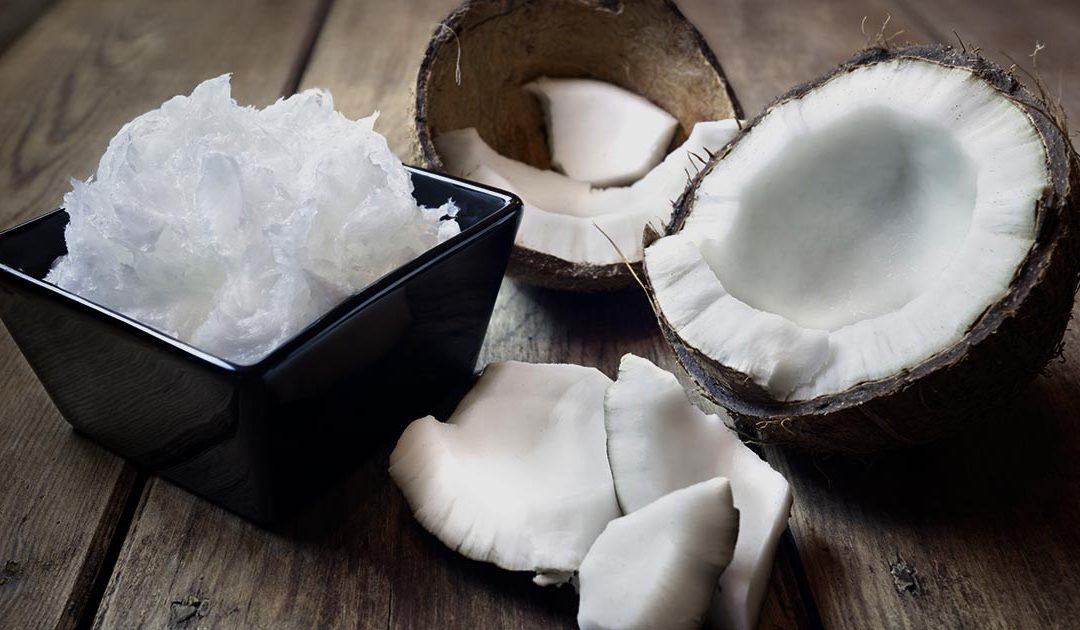Glynn’s Guide
- Coconut oil is a versatile fat that’s suitable for cooking and beverages.
- I would not consider coconut oil to be heart healthy. It’s predominantly saturated fat and raises LDL levels.
- Coconut oil is a great fat source if you’re following a ketogenic diet.
- Many of the beneficial claims about coconut oil are weakly supported.
- Let your budget dictate the type of coconut oil you buy. The benefits of unrefined are not necessarily enough to justify the high cost.
What are some of the coconut oil benefits (claims)?
Over the years, I’ve heard many claims about coconut oil. We’ll review some of these claims in the remainder of the article.
The list that follows is just a list of claims and a response to each.
| Claim | Response |
|---|---|
| Coconut oil may protect your skin, teeth, and hair. | Weak evidence. |
| May reduce harmful abdominal fat. | Supported by some research with very few participants. But not randomized control studies. |
| May boost brain function in Alzheimer patients. | There does seem to be some supporting research. |
| May raise HDL cholesterol. | I did find research to back this claim, but it’s a mild increase. |
| It might improve fullness (reduce hunger). | Nothing valid to support this claim. |
| Coconut oil can possibly minimize seizures. | Nothing valid to support this claim. |
| May encourage lipolysis (fat burning). | Nothing valid to support this claim. |
| It might have antimicrobial effects. | Most studies are in vitro (test tube). Although there may be some validity in conjunction with our gut microbiome…it’s too soon to tell. |
| It might improve your heart’s health. | On the contrary, when consumed with a typical western diet, it raises LDL levels. |
| It contains healthy fatty acids. | There are no magical properties to the fatty acids that make up coconut oil. |
What type of fats make up coconut oil? [Nerd section]
Lauric acid makes up a large portion of coconut oil. Lauric acid is saturated fatty acid, with 12 carbons. It’s considered a medium-chain fatty acid, but it’s at the maximum end of the spectrum. In other words, it’s the longest of medium-chain fatty acids.
Palmitic acid is another predominant fat in coconut oil. It too is a saturated fat, but is longer (16 carbons) and is not considered a medium-chain fatty acid. It also happens to be the predominant fat in butter.
Myristic acid is another fat that makes up a portion of coconut oil. It has a 14 carbon chain length. There are no magical properties for myristic acid.
There are other oils, but the three above make up the majority.
The Lowdown
It’s important to understand that these different fatty acids affect us differently. Only looking at fat as saturated or unsaturated is too simple to define its effect on us.
What are medium-chain triglycerides?
First, what is a triglyceride? [SKIP THIS PART OF YOU DON’T WANT TO NERD OUT..]
The majority of our fat is stored as triglycerides. It’s a glycerol backbone with three (tri-) chains of fatty acids attached. When we break it down via lipoprotein lipase, both the glycerol and the fatty acids are used for energy. Each by different mechanisms.
On a side note, if your insulin levels are high, the breakdown of adipose tissue is minimized. And excess glucose is easily entered into the fatty acid “pool” for adipose storage. I like to point these things out sometimes. Onward…
Remember the fatty acid “chains” mentioned above? Well, they come in varying lengths and are categorized as short-chain, medium-chain, and long chain. How creative!
Medium-chain fatty acids are treated a little differently in our metabolism. They “burn” more efficiently by a different mechanism, so they were touted as a good supplemental source of fat.
BUT HERE’S THE IMPORTANT POINT. The claims with satiation and its ability for a fast burn without storage is limited to MCT oil on its own. So, this DOES NOT apply to coconut oil.
Kinsella states, “Coconut oil cannot be promoted as having the same effects as MCT oil on food intake and satiety.”
Does coconut oil have omega 3?
There is no omega 3 in coconut oil. Eighty to ninety percent of the oils that make up coconut oil is saturated. The remaining unsaturated oils contain only trace amounts of omega 3 or 6 fatty acids.
In other words, too little to count.
Are there coconut oil side effects?
There are no immediate side effects of coconut oil. In fact, an allergy to coconuts is rare. Not impossible, just rare.
That said, the large consumption of coconut oil combined with a high sugar diet over a longer duration is detrimental to cardiovascular health.
Are there any dangers of coconut oil
I don’t like to consider any particular food “dangerous,” per se. But it’s important to acknowledge that one review of sixteen clinical trials in 2020 by Neelakantan, states,
“Coconut oil consumption results in significantly higher LDL-cholesterol than nontropical vegetable oils. This should inform choices about coconut oil consumption.”
This is the same result I found during my literature review.
BUT, what’s important to remember is that no one eats just one food to survive. And I’ve explained before that saturated fats affect cholesterol differently based on other food in the diet.
For instance, a high saturated fat diet on a low or no carbohydrate diet will not have the same effect on cholesterol as a diet with a lot of sugars and starches. And that’s just the simplified big picture.
As I mentioned earlier regarding saturated fat, it’s also dependent on the type of fatty acid.
The Lowdown
I would not consider coconut oil as dangerous as a food. Although excess use combined with a diet high in sugar is dangerous to cardiovascular health in the long term.
How to eat coconut oil
I suppose spooning coconut oil out of the jar is not the best answer as to how to eat coconut oil!
It does make a great addition to coffee, tea, or oatmeal (basically any grain-based hot cereal).
I’ve also found it useful in many recipes requiring oil.
I wouldn’t merely substitute it for other oils in recipes without considering the flavor and other ingredients. Coconut has a high smoke point, so it is versatile.
You will find coconut oil in a lot of ketogenic recipes.
Coconut oil and a ketogenic diet
This is where coconut oil shines! Consuming a high-fat diet devoid of most carbohydrates is more difficult than many think. But one way to add fat without the addition of other macronutrientsa protein, carbohydrate or fat is through the use of coconut oil.
You can learn more about a ketogenic diet in my article How to Get into Ketosis Fast and Staying There [Safely].
How to use coconut oil
Unless you’re trying to add calories quickly on a ketogenic diet, I don’t recommend spooning it out of the jar. Although it does taste good!
It’s a great oil to cook with if the flavor works with the other ingredients.
I’ve also heard that it’s a great moisturizer for our skin. I found a small amount of supporting research. But I imagine it’s greasy and there are better alternatives.
Coconut oil benefits for hair
This topic falls under the cosmetics category, for which I’m not an expert. But that doesn’t mean I can’t do an unbiased literature review. Last I checked, statistics are statistics.
I could not find anything beyond coconut’s ability to penetrate the inside of the hair shaft. This may have application in minimizing damage from environmental factors.
Aside from that, I cannot add to this speculation.
Should I use coconut oil pills?
Save your money.
There’s no valid reason to use coconut oil capsules. This is likely a situation where a supplement company launched a product based on its popularity rather than its legitimate benefits.
Coconut oil powders are something for which I was recently exposed. One of the claims stated, “an easy way to add essential fats to your diet.”
Hogwash!
Pure marketing hype. Again, save your money.
The Lowdown
Please save your money and don’t buy coconut oil pills or powders.
Does coconut oil encourage fat burning?
It’s long been touted that medium-chain triglycerides improve your energy metabolism. At least I can remember the claims as far back as 1990.
But as mentioned earlier, these claims do not apply to coconut oil. Only to medium-chain triglyceride oil taken on its own.
There is some research that the addition of coconut oil may assist in the loss of fat around your waist. The research is weak and there are much better ways to reduce weight.
Coconut oil controversy
Let’s talk about the many studies that look at a particular culture that consumes a lot of coconuts.
Generally, these groups have a lower incidence of cardiovascular disease. That’s great!
But let’s put this into perspective. They tend to eat the meat of the coconut whole rather than in a processed form. They also typically have a diet high in fiber, vegetables, fish, and devoid of sugary foods. This makes a tremendous difference!
So let’s stick to the fact that coconut oil is a saturated fat and should still be limited unless you’re adhering to a ketogenic diet.
What’s the best type of coconut oil?
First of all, is there a difference between virgin coconut oil and extra virgin coconut oil?
No.
Extra virgin coconut oil is simply virgin coconut oil. If you see “extra virgin coconut oil” on a label, it’s marketing hype. Save your greenbacks.
Virgin coconut oil is derived by mechanical means with or without heat. But there are no chemicals used in the process. Regardless of whether it’s a better product or not, the less processing, the better. Although it does have a lower smoke point.
Unrefined coconut oil is just virgin coconut oil.
Refined coconut oil is typically bleached and deodorized. These are additional steps in processing. But do they translate to a less healthy product?
Well, refined coconut oil is lower in phenolic compounds.
So, technically yes. But we obtain a lot of great phenols from vegetables, so this should not weigh heavily on one’s decision.
The Lowdown
The quality of extracted virgin coconut oil is superior, with respect to color and aroma but only slightly better for our health.
Is there a difference between hot and cold coconut oil extraction?
Yes. There appears to be a slight difference between the two methods. Hot extraction showed more antioxidant activity due to the higher level of tocopherolsone of the forms of vitamin E.
Cold extraction uses multiple stages to separate the oil from the rest of the coconut. It does lessen the cost of extraction but lowers the yield of oil. So it costs more in the long run.
Hot extraction (212º-248º F) does not heat coconut oil past its smoke point (approximately 450º F). So there’s very little chemical change to the oil. It denatures the proteins in the whole coconut and boils off the water. It also pasteurizes the oil.
Either method is suitable with very little change to beneficial claims.
Adding coconut oil to beverages
There are certainly popular companies that promote MCT oil extracted from coconut oil. But before their existence, I was using coconut oil in coffee instead of cream. Simply because I liked the flavor and mouthfeel. And if you’ve eliminated dairy products, it’s a good solution.
Coconut oil in tea is also a good replacement for cream if you’re eliminating dairy.
Coconut oil in smoothies is another option. If you’re looking to add fat to a smoothie and the flavor of coconut is appealing, it’s a great choice.
The Lowdown
If you like the flavor of coconut oil, it’s a great replacement for cream in coffee and tea. It’s also a great source of fat in a smoothie.
Coconut oil cooking
The smartest move as to the type of oil to cook with is to base it on both flavor, melting point, and smoke point.
The melting point of coconut oil is between 74º-76º F. No doubt, you’ve experienced this if your kitchen exceeds this temperature.
The smoke point of coconut oil is approximately 450º F. This is a fairly high smoke point for a cooking oil, which makes it versatile and resistant to oxidation. In other words, it’s a good oil to use for cooking. But not for deep frying.
There may be differences in the quantity needed for a recipe when substituting. So, make sure to take this into consideration.
The Lowdown
Since coconut oil is stable at high temperatures, it’s a great selection in recipes that will benefit from a coconut flavor.
Conclusion
If you’re looking to use coconut oil for its flavor in cooking, it’s a great alternative. But the beneficial claims are weak for the most part.
Therefore, I would not recommend adding coconut oil as a supplement. This is especially true if you consume a lot of sugar in your diet.
On the other hand, if you follow a ketogenic diet, coconut oil is a great way to increase your fat calories. Let your budget dictate the type of coconut oil you buy. The benefits of unrefined are not necessarily enough to justify the high cost.
FAQs
Best coconut oil?
Unrefined is a better choice, but not enough to justify spending more if you have a low budget.
When is coconut oil bad?
If you consume a diet high in refined carbohydrates and sugar, coconut is far more detrimental to your heart health.
Are coconut oil capsules good for you?
There’s no benefit. Save your money.
Which coconut oil is best?
Unrefined coconut oil is technically better. But it may not be worth the additional money.
Is there a difference between extra virgin and virgin coconut oil?
Extra virgin coconut oil is simply virgin coconut oil. If you see “extra virgin coconut oil” on a label, it’s marketing hype. Save your greenbacks.
Coconut Oil References & Resources
Agarwal RK, Bosco SJD (2017) Extraction Processes of Virgin Coconut Oil. MOJ Food process Technol 4(2): 00087.
Anagnostou, K. Coconut Allergy Revisited. Children 2017, 4, 85.
Assunção, M.L., Ferreira, H.S., dos Santos, A.F., Cabral, C.R., Jr and Florêncio, T.M.M.T. (2009), Effects of Dietary Coconut Oil on the Biochemical and Anthropometric Profiles of Women Presenting Abdominal Obesity. Lipids, 44: 593-601.
Laurence Eyres, Michael F. Eyres, Alexandra Chisholm, Rachel C. Brown, Coconut oil consumption and cardiovascular risk factors in humans, Nutrition Reviews, Volume 74, Issue 4, April 2016, Pages 267–280.
R. Kinsella, T. Maher, M.E.Clegg, Coconut oil has less satiating properties than medium-chain triglyceride oil, Physiology & Behavior, Volume 179, 1 October 2017, Pages 422-426.
Liau KM, Lee YY, Chen CK, Rasool AH. An open-label pilot study to assess the efficacy and safety of virgin coconut oil in reducing visceral adiposity. ISRN Pharmacol. 2011;2011:949686. doi:10.5402/2011/949686
Marina, A.M., Che Man, Y.B., Nazimah, S.A.H. and Amin, I. (2009), Chemical Properties of Virgin Coconut Oil. J Am Oil Chem Soc, 86: 301-307.
Nithya Neelakantan, Jowy Yi Hoong Seah, Rob M. van Dam, The Effect of Coconut Oil Consumption on Cardiovascular Risk Factors, A Systematic Review and Meta-Analysis of Clinical Trials, Circulation, 2020;141:803–814.
De la Rubia Ortí JE, Sánchez Álvarez C, Selvi Sabater P, et al. How does coconut oil affect cognitive performance in alzheimer patients? Nutricion Hospitalaria. 2017 Mar;34(2):352-356.
Frank M. Sacks, Coconut Oil and Heart Health, Circulation. 2020;141:815–817
Heitor O.Santos,Scott Howell, Conrad P. Earnest, Filipe J. Teixeirad, Coconut oil intake and its effects on the cardiometabolic profile – A structured literature review, Progress in Cardiovascular Diseases, Volume 62, Issue 5, September–October 2019, Pages 436-443.
Yashi Srivastava, Anil Dutt Semwal & Avik Majumdar | Fatih Yildiz (2016) Quantitative and qualitative analysis of bioactive components present in virgin coconut oil, Cogent Food & Agriculture, 2:1.
Monica Teng, Ying Jiao Zhao, Ai Leng Khoo, Tiong Cheng Yeo, Quek Wei Yong, Boon Peng Lim, Impact of coconut oil consumption on cardiovascular health: a systematic review and meta-analysis, Nutrition Reviews, Volume 78, Issue 3, March 2020, Pages 249–259.
Valente, F.X., Cândido, F.G., Lopes, L.L. et al. Effects of coconut oil consumption on energy metabolism, cardiometabolic risk markers, and appetitive responses in women with excess body fat. Eur J Nutr 57, 1627–1637 (2018).


![The 10 Health Benefits of Coconut Oil [Are They True?] 1 Benefits of Coconut Oil](https://www.gymfailedyou.com/wp-content/uploads/2020/06/coconut-oil-benefits.jpg)
![The 10 Health Benefits of Coconut Oil [Are They True?] 2 Types of Fats in Coconut Oil](https://www.gymfailedyou.com/wp-content/uploads/2020/06/fat-types-coconut-oil.jpg)
![The 10 Health Benefits of Coconut Oil [Are They True?] 3 Omega 3 in Coconut Oil](https://www.gymfailedyou.com/wp-content/uploads/2020/06/coconut-oil-fats.jpg)
![The 10 Health Benefits of Coconut Oil [Are They True?] 4 Coconut Oil Dangers](https://www.gymfailedyou.com/wp-content/uploads/2020/06/coconut-oil-dangers.jpg)
![The 10 Health Benefits of Coconut Oil [Are They True?] 5 Coconut Oil Benefits to Hair](https://www.gymfailedyou.com/wp-content/uploads/2020/06/coconut-oil-benefits-hair.jpg)
![The 10 Health Benefits of Coconut Oil [Are They True?] 6 Using Coconut Oil Pills](https://www.gymfailedyou.com/wp-content/uploads/2020/06/coconut-oil-pills.jpg)
![The 10 Health Benefits of Coconut Oil [Are They True?] 7 Adding Coconut Oil to Drinks](https://www.gymfailedyou.com/wp-content/uploads/2020/06/coconut-oil-drink.jpg)
![The 10 Health Benefits of Coconut Oil [Are They True?] 8 Cooking with Coconut Oil](https://www.gymfailedyou.com/wp-content/uploads/2020/06/cooking-with-coconut-oil.jpg)


